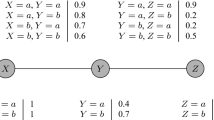Abstract
Multi-agent System is a hot topic of Artificial Intelligence, and it is extensively used to complete some tasks among different agents. While voting is often used for this purpose because it aggregates individual preferences into a collective decision. However, the winner determination problem has seriously hindered the development of the voting theory, then we innovatively introduce the concept of “satisfaction degree” to solve the problem. In this paper, we propose a formula for agents to express satisfaction degree of candidates, which we call Social Satisfaction Degree (SSD). To find the winners from candidates, we then design Single-winner Determination Algorithm (SWDA) and Multi-winner Determination Algorithm (MWDA) for single-winner and multi-winner based on SSD, respectively. The empirical results from the PrefLib data set show that our new algorithms can produce the winner set with optimal SSD more accurately than other voting rules.


Similar content being viewed by others
References
Lu H, Li Y, Mu S et al (2017) Motor anomaly detection for unmanned aerial vehicles using reinforcement learning[J]. IEEE Internet Things J PP(99):1–1
Lu H, Li B, Zhu J et al (2016) Wound intensity correction and segmentation with convolutional neural networks[J]. Concurr Comput Pract Exper 29(6):1–10
Guo H, Cao L (2011) Improvement of Borda voting method in meta search engine [J]. Comput Eng 37 (1):81–83
Xia LR (2013) Introduction of computational social choice theory [J]. Commun CCF 9(10):8–14
Endriss U (2014) Social choice theory as a foundation for multi-agent systems[M]. Springer International Publishing, Berlin, pp 1–6
Pitt J, Kamara L, Sergot M et al (2006) Voting in multi-agent systems[J]. Comput J 49(2):156–170
Mao A, Procaccia AD, Chen Y (2013) Better human computation through principled voting[C]. In: Proceedings of the 27th AAAI Conference on Artificial Intelligence. AAAI Press, 2013:1142–1148
Nurmi H (1987) Comparing voting systems[M]. Springer Netherlands 3(4393):187–189
Soufiani HA, Parkes DC, Xia L (2012) Random utility theory for social choice[J]. Adv Neural Inf Process Syst 1:126–134
Bartholdi JJ III, Orlin JB (1991) Single transferable vote resists strategic voting. Soc Choice Welfare 8 (4):341– 354
Lagerspetz E (2016) Plurality, approval, or Borda? A nineteenth century dispute on voting rules[J]. Publ Choice 168 (3-4):1–13
Richie R (2004) Instant runoff voting: what mexico (and others) could learn. Elect Law J 3:501C512
Brams SJ, Kilgour DM (2014) Satisfaction Approval Voting. In: Fara R., Leech D., Salles M. (eds) Voting Power and Procedures. Studies in Choice and Welfare. Springer, Cham. https://doi.org/10.1007/978-3-319-05158-1_18
Chen J (2015) The game theory of the classic voting model-theory and practice of Borda Count [J]. Admin Forum 4:75– 79
Aziz H, Walsh T (2015) Algorithms for two variants of Satisfaction Approval Voting. CoRR arXiv:1501.02144
Falmagne JC, Regenwetter M (1996) A random utility model for approval voting[J]. J Math Psychol 40 (2):152– 159
Singh SP (2014) Not all election winners are equal: satisfaction with democracy and the nature of the vote[J]. Eur J Polit Res 53(2):308C327
Acknowledgments
Project supported by the National Nature Science Foundation of China (Grant No. 61170201, No. 61070133, No. 61472344); Six-talent peaks project in Jiangsu Province (Grant No. 2011-DZXX-032). Innovation Foundation for graduate students of Jiangsu Province (Grant No. CXLX12 0916), Jiangsu Science and Technology Project No. BY2015061-06BY2015061-08, Yangzhou Science and Technology Project No. SXT20140048, SXT20150014, SXT201510013, Natural Science Foundation of the Jiangsu Higher Education Institutions (Grant No. 14KJB520041), Innovation Program for graduate students of Jiangsu Province (Grant No. SJZZ16_0261).
Author information
Authors and Affiliations
Corresponding author
Rights and permissions
About this article
Cite this article
Teng, L., Zhu, J., Li, B. et al. A Voting Aggregation Algorithm for Optimal Social Satisfaction. Mobile Netw Appl 23, 344–351 (2018). https://doi.org/10.1007/s11036-017-0934-6
Published:
Issue Date:
DOI: https://doi.org/10.1007/s11036-017-0934-6




